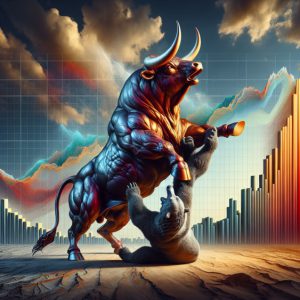Introduction to Paradoxes in Trading and Success
Updated Nov 27, 2023
In the intricate tapestry of trading and success, we encounter paradoxes that challenge conventional wisdom, revealing the subtle intricacies of human behaviour and decision-making. These paradoxes, woven into the fabric of the provided text, illuminate the contradictions inherent in our pursuit of prosperity. Let’s delve into these thought-provoking subtopics that unravel the paradoxical nature of trading, success, and the intricate dance between effort and outcomes.
The Paradox of Insanity:
The quote, “No matter who you are, how intelligent or how much education you have, if you keep doing the same thing over and over again, expecting different results, you are suffering from the most insidious form of insanity”, highlights the paradoxical nature of repeating unsuccessful actions while hoping for a different outcome.
When individuals continuously engage in the same actions, hoping for different outcomes, they fall victim to a self-imposed trap. This repetitive behaviour can be seen as stagnation, where personal growth and progress become hindered. It reflects a lack of adaptability and an unwillingness to explore alternative approaches or solutions.
One of the dangers of this pattern is that it can perpetuate a cycle of disappointment and frustration. By stubbornly adhering to ineffective strategies or behaviours, individuals may face the same undesirable consequences repeatedly. This can lead to a sense of helplessness and despair, further reinforcing the negative aspects of their situation.
Moreover, the paradox of insanity can be particularly detrimental in relationships. For example, in toxic or abusive dynamics, individuals may repeatedly forgive their partner’s harmful behaviour, hoping for a change that never materializes. This can result in prolonged suffering, emotional distress, and a loss of self-worth. By remaining trapped in such patterns, individuals inadvertently contribute to their own misery.
At a societal level, the paradox of insanity can manifest in various ways. It can be observed in political systems that persistently cling to failed policies, disregarding the negative consequences on the population. Economic structures prioritising short-term gains over long-term sustainability also fall into this category. In these cases, the unwillingness to adapt and experiment with new ideas can lead to systemic issues and hinder progress.
To break free from the paradox of insanity, individuals must recognize the importance of self-reflection and introspection. They must be willing to challenge their assumptions and beliefs and actively seek alternative perspectives and approaches. Embracing change and learning from past mistakes is crucial for personal growth and development.
Trading’s Insanity Trap: Break the Cycle for Lasting Success
Regarding trading, the Paradox of Insanity can have severe consequences. Many traders fall into the trap of repeatedly employing unsuccessful strategies, hoping for different results. This can lead to substantial financial losses and hinder their progress in the market.
By continuously engaging in the same trading patterns without adapting to changing market conditions, traders risk missing out on profitable opportunities or failing to mitigate potential risks. This rigid mindset can prevent them from exploring alternative approaches and learning from past mistakes.
For example, a trader who consistently relies on a single trading indicator or technique, regardless of its effectiveness, may be trapped in a cycle of losses. Ignoring market trends or failing to adjust their strategy to evolving market dynamics can lead to significant financial setbacks.
On the other hand, traders who embrace adaptability and are willing to learn from their experiences can leverage the Paradox of Insanity to their advantage. They recognize that markets are constantly changing, and successful trading requires a willingness to adjust strategies based on new information and market conditions.
Such traders actively seek to expand their knowledge and skills, exploring different trading methodologies and risk management techniques. Adopting a flexible approach allows them to adapt to market trends and potentially identify profitable opportunities others may overlook.
Additionally, in the context of trading, the Paradox of Insanity can also be seen in chasing losses. Some traders, driven to recoup their losses quickly, may make impulsive and reckless trading decisions. This behaviour often leads to further losses, exacerbating the initial setback.
To avoid the negative consequences of the Paradox of Insanity in trading, traders need to cultivate discipline, self-awareness, and a willingness to adapt. They should continuously evaluate their trading strategies, learn from both successes and failures and be open to adjusting their approach based on changing market conditions.
By embracing a growth mindset and actively seeking to improve their trading skills, traders can break free from the cycle of repeating unsuccessful actions. They can increase their chances of success in the markets by adapting to emerging trends, managing risks effectively, and making informed decisions based on a comprehensive understanding of the market dynamics.
Overall, the Paradox of Insanity in trading highlights the importance of adaptability and learning from past experiences. Traders who resist the temptation to repeat unsuccessful actions and instead embrace change and growth have a better chance of achieving long-term success in the markets.
The Paradox of Seeking Success:
The Paradox of Seeking Success in trading is a common challenge many aspiring traders face. It refers to individuals investing significant time, effort, and resources into acquiring knowledge, subscribing to various services, and immersing themselves in information, yet struggling to achieve consistent trading success.
One of the critical aspects of this paradox is the notion of information overload. In today’s digital age, traders can access an overwhelming amount of information, including market analysis, trading strategies, news, and expert opinions. While knowledge and information are undoubtedly valuable, excessive consumption without a clear framework or plan can lead to confusion, analysis paralysis, and poor decision-making.
Studying extensively and subscribing to various services can give traders a false sense of progress and accomplishment. They may believe that by accumulating more information, they are increasing their chances of success. However, without the ability to filter and apply the relevant information effectively, the acquired knowledge becomes a burden rather than an asset.
Moreover, excessive effort can lead to diminishing returns. Traders need to strike a balance between acquiring knowledge and putting that knowledge into practice. Simply accumulating information without taking action or applying it in a disciplined manner can hinder progress and impede the development of practical trading skills.
The Paradox of Seeking Success also highlights the importance of quality over quantity. Instead of consuming vast amounts of information indiscriminately, traders should focus on acquiring knowledge from credible sources and developing a deep understanding of core concepts and principles. This allows traders to build a solid foundation and develop a coherent trading strategy based on sound principles rather than relying solely on external inputs.
Another aspect of this paradox is its psychological impact on traders. Despite their extensive efforts, traders may still struggle to achieve consistent success. This can lead to frustration, self-doubt, and a loss of confidence. The constant pursuit of success without tangible results can be emotionally draining and may discourage individuals from continuing their trading journey.
To overcome the Paradox of Seeking Success, traders should shift their focus from simply acquiring information to developing a robust trading plan and implementing effective risk management strategies. They should prioritize practical experience and learning from real-world trading situations rather than relying solely on theoretical knowledge.
Additionally, traders should adopt a growth mindset and embrace the iterative process of learning from both successes and failures. This involves analyzing past trades, identifying patterns, and making adjustments to refine their approach. Discipline, patience, and resilience are also crucial in trading challenges.
The Paradox of Control:
The Paradox of Control in trading highlights the inherent contradiction between the desire to exert control over the market and the limits of that control. The author’s experience of attempting to manipulate the market through strategies like averaging down and refusing to take stops serves as an example of how these actions can worsen their trading situation.
In trading, there is a natural inclination to control outcomes and minimize losses. Traders often believe that by exerting control over their trades, they can manipulate the market to conform to their desired outcomes. However, the reality is that the market operates independently of any individual trader, influenced by a myriad of factors beyond their control.
Averaging down, which involves buying more of an asset as its price declines, is a strategy some traders employ to lower their average entry price. While attempting to control losses through this method may seem logical, averaging down can compound losses if the market continues to move against the trader. It is a risky strategy that relies on the assumption that the market will eventually reverse, which is not always the case.
Refusing to take stops or ignoring predetermined exit points is another attempt to exert control over trades. Traders may believe that holding onto losing positions can eventually turn them into profitable trades. However, this approach often leads to more enormous losses and an inability to manage risk effectively. It disregards the importance of risk management and accepts that not all trades will be profitable.
The paradox lies in the realization that the more traders try to control the market, the less control they have. Markets are influenced by many factors, such as economic news, geopolitical events, and investor sentiment, which are beyond any individual trader’s manipulation. Attempting to control or manipulate these external forces is an exercise in futility.
To break free from the Paradox of Control, traders must accept the limits of their control and focus on what they can manage effectively. This involves developing a disciplined trading plan, setting realistic goals, and implementing proper risk management techniques. It also means understanding that losses are an inherent part of trading and being willing to take necessary stops to protect capital.
Instead of trying to control the market, traders should focus on maintaining their actions and reactions to market conditions. This includes managing emotions, adhering to a trading plan, and continuously learning and adapting to market dynamics. By accepting the limits of control and embracing a more disciplined and adaptable approach, traders can navigate the complexities of the market more effectively.
The Paradox of Letting Go:
The Paradox of Letting Go explores the notion that by relinquishing attachment and desire for power or success, individuals can experience a greater sense of fulfilment and achievement. The statement “The most exquisite paradox is that as soon as you give it all up, you can have it all” encapsulates this idea.
In many aspects of life, including trading, there is a natural inclination to strive for power, success, and material possessions. Individuals often believe acquiring more and exerting control over external factors will lead to happiness and fulfilment. However, this approach can sometimes lead to a perpetual cycle of desire and dissatisfaction.
The paradox lies in the realization that true fulfilment does not necessarily come from external achievements but rather from an internal state of contentment and letting go of attachment to outcomes. By releasing the need for immediate gratification and surrendering the attachment to specific outcomes, individuals can experience a greater sense of inner peace and clarity.
In the trading context, the paradox of letting go can be applied in various ways. For example, traders may become fixated on maximizing profits or achieving a specific level of success, which can lead to impulsive and emotionally driven trading decisions. This attachment to outcomes can cloud judgment and hinder the ability to make rational and objective decisions.
By letting go of the attachment to immediate gains and focusing instead on a disciplined and patient approach, traders can potentially achieve better long-term results. This involves accepting that losses are an inevitable part of trading and being able to detach emotionally from individual trades. It also means relinquishing the need to control the market and embracing the uncertainties and fluctuations of trading.
Letting go of attachment and desire for power or success also allows individuals to cultivate a mindset of gratitude and appreciation for the present moment. Rather than constantly chasing external achievements, individuals can find contentment in learning and growth, regardless of the outcomes.
Moreover, by letting go of the need for power and control, individuals can create space for new possibilities and opportunities to emerge. This openness and receptivity to the present moment can lead to a greater sense of flow and creativity, enabling individuals to make better decisions and seize favourable market conditions.
The Paradox of Success and Mortality
The Paradox of Success and Mortality explores the idea that the intense pursuit of success, whether in business or health, can sometimes have unintended negative consequences. The story of the friend diagnosed with cancer and the discovery that mental effort and focus on the disease can adversely affect survival time exemplifies this paradox.
In the pursuit of success, individuals often dedicate significant mental and physical effort towards achieving their goals. This can involve working long hours, pushing oneself to the limit, and constantly striving for improvement. While this drive and ambition can benefit many aspects of life, it can also come with a cost.
The story of a friend diagnosed with cancer illustrates how intense mental effort and focus on the disease can have adverse effects on survival time. The paradox lies in the realization that the relentless pursuit of success can lead individuals to neglect their physical and mental well-being, ultimately impacting their overall health and potentially worsening the course of a severe illness.
The intense focus on success, whether in business or health, can create a high-stress environment. Stress has been linked to various adverse health outcomes, including compromised immune function and increased susceptibility to certain diseases. When individuals become consumed by their pursuit of success, they may neglect self-care, manage stress effectively and overlook essential aspects of their well-being.
Furthermore, the story highlights the importance of balance and perspective. While striving for success and achievement is natural, it is equally important to take care of one’s health and well-being. Neglecting self-care in the relentless pursuit of success can lead to physical and mental exhaustion, burnout, and the potential for long-term negative consequences.
The paradox here is that the intensity and focus on success individuals believe will lead to positive outcomes can sometimes have unintended negative consequences, including compromising health and well-being. It underscores the need for individuals to maintain a holistic approach to success that encompasses physical, mental, and emotional well-being.
Individuals must find a balance between their ambitions and taking care of themselves. This includes prioritizing self-care, managing stress effectively, and seeking support when needed. By cultivating a holistic approach to success that considers both professional or personal goals and overall well-being, individuals can strive for achievement without sacrificing their health and quality of life.
The Paradox of Mental Influence:
The Paradox of Mental Influence explores the idea that our thoughts and beliefs can significantly impact our outcomes, yet focusing excessively on a problem or disease can paradoxically strengthen its hold on us.
Our thoughts and beliefs are crucial in shaping our perception of the world and influencing our actions and behaviours. Positive and empowering thoughts can motivate us, boost our confidence, and improve our chances of success. Conversely, negative and limiting thoughts can hinder our progress, lower our self-esteem, and contribute to adverse outcomes.
However, there is a paradoxical aspect to mental influence. While our thoughts and beliefs can be powerful tools for shaping our reality, excessive focus on a problem or disease can intensify its impact on our lives. When we constantly dwell on negative thoughts or fixate on the issue at hand, we may inadvertently give it more power and control over our well-being.
This paradox can be observed in various contexts. For instance, in the realm of health and wellness, studies have shown that stress and anxiety can have detrimental effects on physical health. When individuals become excessively preoccupied with their health issues or constantly worry about their symptoms, it can exacerbate their condition and hinder the healing process.
Similarly, in other aspects of life, such as personal relationships or professional challenges, fixating on problems can impede progress and hinder finding effective solutions. The more we focus on the problem, the more it occupies our thoughts and emotions, making it challenging to see alternative perspectives or opportunities for growth.
One explanation for this paradox is that excessive mental focus on a problem amplifies negative emotions and reinforces negative thought patterns. It creates a cycle where the problem becomes more prominent in our minds, leading to increased stress and anxiety, which in turn can perpetuate the problem. This heightened mental focus can distract us from solutions or limit our ability to think creatively and adaptively.
It is essential to balance acknowledging the problem and maintaining a constructive mindset to navigate the Paradox of Mental Influence. Recognizing the issue is crucial, as it allows us to take appropriate action and seek the necessary support. However, it is equally vital to avoid fixating on the problem to the point where it becomes all-consuming.
Practising mindfulness and cultivating a positive mindset can help mitigate the paradoxical effects of mental influence. By being aware of our thoughts and emotions, we can consciously shift our focus towards constructive and empowering beliefs. This shift in mindset can open up new possibilities, enhance problem-solving abilities, and improve overall well-being.
The Paradox of Effort:
The Paradox of Effort explores that relentless effort and willpower, while commonly associated with achievement and success, can also harm well-being and longevity. The statement “our apparent success can kill us” encapsulates the paradoxical nature of this idea.
In many aspects of life, including personal and professional pursuits, there is a prevailing belief that exerting maximum effort and willpower is essential for success. Hard work, determination, and a relentless drive are often glorified and admired. However, it is necessary to recognize that this approach can have a downside.
The paradox lies in the realization that excessive and unbalanced effort can take a toll on physical and mental well-being. When individuals prioritize achievement at all costs and neglect self-care, they may experience high-stress levels, burnout, and compromised health.
The statement “our apparent success can kill us” suggests that pursuing success can become all-consuming, to the point where individuals sacrifice their well-being. They may push themselves beyond their limits, neglect rest, and disregard their physical and emotional needs. This relentless effort can lead to chronic stress, fatigue, and an increased risk of physical and mental health issues.
Moreover, the paradox of effort highlights the importance of balancing striving for success and maintaining a healthy lifestyle. This is not to say that effort and willpower are inherently harmful or should be avoided, but rather that they need to be tempered with self-care, rest, and a holistic approach to well-being.
Taking breaks, practising self-care activities, and maintaining a healthy work-life balance are crucial for sustaining long-term success and well-being. It is essential to recognize that success is not solely defined by external achievements but also by maintaining good health, nurturing relationships, and finding fulfilment in various aspects of life.
By embracing the paradox of effort, individuals can strive for success while prioritizing their well-being. This involves setting realistic goals, managing time effectively, and being aware of personal limits. It also means cultivating self-compassion and recognizing that success is not solely determined by external accomplishments but by happiness and fulfilment.
Paradoxes: The Scorpion And The Frog
The Scorpion and the Frog
by Janice Dorn, M.D., PhD.
Contributor
Tactical Investor
A scorpion and a frog meet on the bank of a stream, and the
scorpion asks the frog to carry him across on its back. The
frog asks, “How do I know you won’t sting me?” The scorpion
says, “Because if I do, I will die too.”
The frog is satisfied, and they set out, but in midstream,
the scorpion stings the frog. The frog feels the onset of
paralysis and starts to sink, knowing they both will drown,
but has just enough time to gasp. “Why?”
Replies the scorpion: “It’s my nature…”
Aesop’s Fables
________________________________________
No matter who you are, how intelligent or how much education you have, if you keep doing the same thing over and over again, expecting different results, you are suffering from the most insidious form of insanity. This is self-delusion of the highest degree.
Years ago, when I started to trade, I was so optimistic that I could make money consistently. I was smart, more educated than almost anyone I knew, a successful physician, and always had been able to study hard and master anything I put my mind to. I could do it, and nothing was going to stop me. I would work longer and more intensely than anyone else and show fabulous profits month after month.
Little did I know what I was facing and that I was about to come head-on with the most challenging task of my lifetime. Simple, maybe…. but not easy. Not easy at all. After a few months, I found myself dancing as fast as I could, yet running on a treadmill, going nowhere and suffering from vertigo, headache and a severe case of tick-itis. I studied and read everything I could lay my hands on, subscribed to service after service, looking for the Holy Grail and struggling to make consistently successful trades. Why couldn’t I do it? What was wrong?
Is this so difficult? What about all the people with returns more significant than 80% a year? They couldn’t be exaggerating, could they? After all, it’s in print and on a heavily subscribed website, so it must be true. Mustn’t it? So I studied more, subscribed to more services, learned new indicators, bought books, joined chat rooms and saturated myself with information. This produced more vertigo, headache and sleep deprivation. I was in total information overload. I started sleeping sitting up so I would not sleep too deeply and could awaken more easily at 4:30 AM (having gone to sleep at around 1:30 AM) to study and watch the markets before they opened at 6:30 AM.
I was in total immersion, so why couldn’t I make consistently successful trades? I became paranoid, thinking it was a conspiracy since every time I took a position, it went against me. I knew the stop and was stopped out in my mind, but we didn’t take the stops because I had faith that the position would come back. Some misunderstanding or misinterpretation of the market was responsible for the price spiralling downward.
Buy more. That’s it. Average down and keep averaging down, and eventually, I will get it right. Ultimately, the price will return, and I will be justified. Why isn’t the price coming back? I know it has to. After all, I studied, charted, listened to the gurus, read everything on every bulletin board, and it HAS to come back. Oh, that news that just came out… Ugh! It must be false or overstated because there is no reason that the stock should be selling off like that.
I know it is coming back, so I will buy more. Wow!! Look at the size of the position now. Hmm. I better kick it up a notch and start participating on every message board, studying every report and watching every tick every day for signs that life is returning, and I can get back from underwater. Most of you know how this feels. I do. I have been there, lived it, and suffered losses from it. Life was miserable this way. I became depressed and irritable. I walled myself off from the rest of the world, just trying to figure out what to do. I had dug a deep hole; the only way out was to sell and take the losses. OR- wait and be in agony day after day, watching my account and my self-esteem (what was left of it) erode like shifting sands.
I tried too hard, studied too much, and pushed myself to the point of both physical and mental exhaustion. Why? Why did I not honour the stop, continue to hold on, and even average down? I had to kill the frog and kill myself in the process figuratively. To be reborn, I had to destroy the internal self-defeating programming and start again. I had to step back and look at what I had done with a sharp, penetrating glare in the bright light of day. I decided to take the loss, to stop trading for a while, to take a vacation and centre myself. My health returned. The dizziness and headache went away. I didn’t care so much about watching the flickering ticks (at least, I was in remission from a severe case of tick-itis).
It was not the market, the charts, the software, the gurus or anyone/anything else but I. I was my worst enemy. Nothing was going to change until I got right with myself.
…To be continued….
The most exquisite paradox is that you can have it all as soon as you give it all up.
As long as you want power, you can’t have it. The minute you don’t want power,
you’ll have more than you ever dreamed possible…
Ram Dass
‘ 2004 Janice Dorn, M.D., PhD.
Paradoxes: The Mortality of Mortals
by John Tyler CEO www.Trader007.com
If you think that this ‘Law of Paradoxes’ is for eggheads, think again. It could mean your life!
A friend has just been diagnosed with highly cancer. He knows that the treatment, even if successful, has many adverse side effects. His business has been successful and based on 110% effort, willpower and pure doggedness. Hence, he believes he’ll beat this by applying the same principles.
This is the ultimate Paradox Law: our apparent success can kill us.
There is statistical proof of this Law in action in health and disease. I first became aware of this in the 1980s when we looked at the mortality rates from a specific type of malignant tumour. The surprising finding was that the survival time was related to the time of diagnosis and not the size of the tumour! This could not be explained even by the adverse effect of treatment. Now we know, however, that the mental effort of the unfortunate victims acted to ensure their eventual death, no matter how advanced the tumour was at the time. More radical life-extending therapies now mask these results, but it may be that the window has just been opened wider.
The Law of Paradox here is that focusing on the disease, tumour or whatever strengthens its hold over the victim!
There are right ways to think, as well as to act, for both health and trading are concerned. An ignorant approach can taint all our efforts. Don’t become another statistic proving the effectiveness of the Laws of Paradox.
‘ Cured yesterday of my disease,
I died last night of my physician.’
- Prior 1664-1721: The Remedy Worse than Disease.’
‘ 2004 John Tyler CEO
www.Trader007.com
Unveil the Hidden Gems: Explore More

Which Type of Account Offers Tax-Deferred Investing for Retirement?

How to Start Saving for Retirement at 35 and Ensure a Comfortable Future

The Unveiling: Proof Oil Is Not a Fossil Fuel—A Deeper Dive

Blue Gas Unleashed: Separating Hype from Sustainable Reality

From Striving to Thriving: How to Start Saving for Retirement at 50 – It’s Not Too Late

The Power of Saving: Why is Saving Money So Important for Your Future?

What is a Bull Market vs Bear Market: Timeless Insights from Investment Pioneers

Which Is the Best Option for a 22-Year-Old Investing for Their Retirement? Stocks

The Lavish Tale of the Dot-Com Bubble: When the Internet Took the World by Storm

Why Diversification Is an Important Part of Investing: It’s Critical to Success

Unleashing the Beasts: What is a Bull Market? What is a Bear Market

Explain Why Diversification Is Such an Important Concept When It Comes to Investing for Your Future

How to Achieve Financial Freedom Before 30: Strategic Solutions

What is a Bull Market? Unleashing its Power

Unlocking the Secrets: How to Achieve Financial Independence?
Brain Control: Absolute Control Via Pleasure



